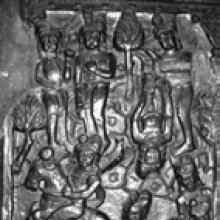Vidhura, Vidhūra, Vidhurā, Vidhuragati: 15 definitions
Introduction:
Vidhura means something in Buddhism, Pali, Hinduism, Sanskrit, Marathi, Jainism, Prakrit, Hindi. If you want to know the exact meaning, history, etymology or English translation of this term then check out the descriptions on this page. Add your comment or reference to a book if you want to contribute to this summary article.
Alternative spellings of this word include Vidhur.
Images (photo gallery)
In Buddhism
Theravada (major branch of Buddhism)
Source: Pali Kanon: Pali Proper Names1. Vidhura. A brahmin, chaplain of the king of Benares. For details see the Sambhava Jataka. He is identified with Maha Kassapa (J.v.67). Vidhuras son was Bhadrakara. J.v.60.
2. Vidhura. The Bodhisatta born as the minister of Dhananjaya Korabba. See the Vidhurapandita Jataka.
His father was the brahmin Canda (J.vi.262), and he owned three palaces: Konca, Mayura and Piyaketa (J.vi.289). Anujja was his wife and Ceta his daughter in law; among his sons was Dhammapala (J.vi.290).
In one place (J.vi.301) he is spoken of as having one thousand wives and seven hundred female slaves.
The Vidhurapandita of the Dhumakari Jataka is probably identical with the above, as also the minister of the same name in the Dasabrahmana Jataka. The latter contains a long discussion between Vidhura and the Korabba king regarding the qualities of a true brahmin.
3. Vidhura. The Milinda Panha (p.202) refers to a birth of the Bodhisatta in which he was a wise man (pandita) named Vidhura. At that time Devadatta, although a jackal, brought the kings of all Jambudipa under his sway. The reference is evidently to the Sabbadatha Jataka (No. 241), but there the Bodhisattas name is not given.
4. Vidhura. See also Vidhura.
-- or --
1. Vidhura. One of the two chief disciples of Kakusandha Buddha. (D.ii.4; S.ii.191; Bu.xxiii.20. J.i.42).
He received his name because he was a peerless preacher of the Dhamma. (M.i.333; quoted at PSA. p. 496).
2. Vidhura. See Vidhura.
Theravāda is a major branch of Buddhism having the the Pali canon (tipitaka) as their canonical literature, which includes the vinaya-pitaka (monastic rules), the sutta-pitaka (Buddhist sermons) and the abhidhamma-pitaka (philosophy and psychology).
Languages of India and abroad
Pali-English dictionary
Source: Sutta: The Pali Text Society's Pali-English DictionaryVidhura, (adj.) (Vedic vidhura: see vidhavā) 1. destitute, lonely; miserable, wretched J. V, 399 (so read for vidura; according to Kern, Toev. s. v. but doubtful). ‹-› 2. (vi+dhura) “burdenless, ” unequalled Sn. 996 (=vigata-dhura, appaṭima SnA 583); A. I, 116 (here in meaning “clever, ” perhaps=vidura; spelt vidhūra). Cp. Np. Vidhura KhA 128; SnA 201 (as Vidhūra at J. IV, 361). (Page 623)

Pali is the language of the Tipiṭaka, which is the sacred canon of Theravāda Buddhism and contains much of the Buddha’s speech. Closeley related to Sanskrit, both languages are used interchangeably between religions.
Marathi-English dictionary
Source: DDSA: The Molesworth Marathi and English Dictionaryvidhura (विधुर).—m S A widower.
--- OR ---
vidhura (विधुर).—a S Defective, deficient, wanting, imperfect, incomplete.
Source: DDSA: The Aryabhusan school dictionary, Marathi-Englishvidhura (विधुर).—m A widower. a Deficient, wanting.
Marathi is an Indo-European language having over 70 million native speakers people in (predominantly) Maharashtra India. Marathi, like many other Indo-Aryan languages, evolved from early forms of Prakrit, which itself is a subset of Sanskrit, one of the most ancient languages of the world.
Sanskrit dictionary
Source: DDSA: The practical Sanskrit-English dictionaryVidhura (विधुर).—a. [vigatā dhūryasya ac samā° Uṇādi-sūtra 1.39]
1) Distressed, troubled, afflicted, overwhelmed with grief, miserable; अवस्थामापन्ना मदनदहनोद्दाहविधुराम् (avasthāmāpannā madanadahanoddāhavidhurām) Mālatīmādhava (Bombay) 2.3; 9.11; Uttararāmacarita 3.38;6.41; Kirātārjunīya 11.26; Śiśupālavadha 9.77;17.66; Bhartṛhari 3.8,134; नेत्राग्निप्लोषमूर्च्छाविधुरविनिपतत्सानलद्वादशार्कः (netrāgniploṣamūrcchāvidhuravinipatatsānaladvādaśārkaḥ) Nāg.5.31.
2) Love-lorn, bereaved, suffering separation from a wife or husband; मयि च विधुरे भावः कान्ताप्रवृत्तिपराङ्मुखः (mayi ca vidhure bhāvaḥ kāntāpravṛttiparāṅmukhaḥ) V.4.2; विधुरां ज्वलनातिसर्जनान्ननु मां प्रापय पत्युरन्तिकम् (vidhurāṃ jvalanātisarjanānnanu māṃ prāpaya patyurantikam) Kumārasambhava 4.32; विधुरबन्धुरबन्धुरमैक्षत (vidhurabandhurabandhuramaikṣata) Śiśupālavadha 6. 29;12.8; निर्व्याजं विधुरेष्वधीर इति मां येनाभिधत्ते भवान् (nirvyājaṃ vidhureṣvadhīra iti māṃ yenābhidhatte bhavān) Nāg.2.3.
3) Devoid, deprived, or destitute of, free from; त्वामाद्यन्तान्तरवर्ति त्रयविधुरः (tvāmādyantāntaravarti trayavidhuraḥ) Bhāgavata 6.16.36; सा वै कलङ्कविधुरा मधुराननश्रीः (sā vai kalaṅkavidhurā madhurānanaśrīḥ) Bv.2.5.
4) Adverse, hostile, unfriendly; कूपान्तः पतितः करोतु विधुरे किं वा विधौ पौरुषम् (kūpāntaḥ patitaḥ karotu vidhure kiṃ vā vidhau pauruṣam) Pañcatantra (Bombay) 2.85.
5) Unable, helpless; प्रतिक्रियायै विधुरः (pratikriyāyai vidhuraḥ) Kirātārjunīya 17. 41.
6) Incapable to perform अनुष्ठानशून्य (anuṣṭhānaśūnya)); अनुत्पन्नं ज्ञानं यदि यदि च संदेहविधुरम् (anutpannaṃ jñānaṃ yadi yadi ca saṃdehavidhuram) Mv.3.36.
7) Infirm, drooping (vigalita); हयेश्च विधुरग्रीवै रथैश्च शकलीकृतैः (hayeśca vidhuragrīvai rathaiśca śakalīkṛtaiḥ) Mahābhārata (Bombay) 7.146.25.
-raḥ A widower.
-ram 1 Alarm, fear, anxiety.
2) Separation from a wife or husband, bereavement suffered by a lover or mistress.
3) Calamity, distress; विधुरं किमतः परम् (vidhuraṃ kimataḥ param) Kirātārjunīya 2.7.
--- OR ---
Vidhura (विधुर).—a. Destitute of a shaft (as a carriage).
--- OR ---
Vidhurā (विधुरा).—Curds mixed with sugar and spices (Mar. śrīkhaṃḍa).
Source: Cologne Digital Sanskrit Dictionaries: Shabda-Sagara Sanskrit-English DictionaryVidhura (विधुर).—mfn.
(-raḥ-rā-raṃ) 1. Agitated, distressed, overcome with anxiety, distress, &c. 2. Bewildered, confused, (with fear, liquor, &c.) 3. Separate, absent from a mistress or lover. 4. Destitute of, free from. 5. Hostile, adverse. m.
(-raḥ) A widower. n. (-ra) 1. Separation. 2. Agitation of mind from terror or distress, &c. f.
(-rā) Curds mixed up with sugar and spices. E. vi before, dhura a load, &c., aff. ap .
Source: Cologne Digital Sanskrit Dictionaries: Benfey Sanskrit-English DictionaryVidhura (विधुर).—i. e. vyadh + ura, I. adj. 1. Trembling, [Śiśupālavadha] 9, 77; agitated, [Bhartṛhari, (ed. Bohlen.)] 1, 37. 2. Bewildered, [Uttara Rāmacarita, 2. ed. Calc., 1862.] 78, 1. 3. Adverse, [Pañcatantra] 42, 13; i. [distich] 220. 4. Separate from a mistress or lover, abandoned, [Nalodya, (ed. Benary.)] 3, 50; [Meghadūta, (ed. Gildemeister.)] 113; [Vikramorvaśī, (ed. Bollensen.)] [distich] 102. Ii. n. 1. Agitation of mind. 2. Danger, [Hitopadeśa] 50, 8. 3. Separation.
Source: Cologne Digital Sanskrit Dictionaries: Cappeller Sanskrit-English DictionaryVidhura (विधुर).—[masculine] robbed of the pole (carriage); i.[grammar] bereft, alone; separated from, destitute of, lacking (—°); defective, incomplete; depressed, wretched, miserable; adverse, contrary, unfavourable; [neuter] [adverb], as subst. adversity, misfortune.
Source: Cologne Digital Sanskrit Dictionaries: Monier-Williams Sanskrit-English Dictionary1) Vidhura (विधुर):—[=vi-dhura] [from vi] 1. vi-dhura mf(ā)n. destitute of a shaft (as a carriage), [Mahābhārata vi, 1890] (perhaps ‘damaged’ = vidhura2 See sub voce)
2) [from vidh] a See p. 968, col. 2.
3) [from vidhu] 2. vidhura mf(ā)n. (for 1. See p. 951, col. 1) bereft, bereaved ([especially] of any loved person), alone, solitary, [Kāvya literature; Rājataraṅgiṇī]
4) [v.s. ...] (ifc.) separated from, destitute of, wanting, [Bhāgavata-purāṇa; Sarvadarśana-saṃgraha]
5) [v.s. ...] suffering from want, miserable, helpless, distressed, [Mahābhārata; Kāvya literature] etc.
6) [v.s. ...] perplexed, troubled, depressed, dejected (am ind.), [Kāvya literature; Kathāsaritsāgara; Rājataraṅgiṇī]
7) [v.s. ...] adverse, unfavourable, hostile, [ib.]
8) [v.s. ...] m. a Rākṣasa, [cf. Lexicographers, esp. such as amarasiṃha, halāyudha, hemacandra, etc.]
9) [v.s. ...] a widower, [Monier-Williams’ Sanskrit-English Dictionary]
10) Vidhurā (विधुरा):—[from vidhura > vidhu] f. curds mixed with sugar and spices, [cf. Lexicographers, esp. such as amarasiṃha, halāyudha, hemacandra, etc.]
11) Vidhura (विधुर):—[from vidhu] n. adversity, calamity, distress, [Kathāsaritsāgara] ([cf. Lexicographers, esp. such as amarasiṃha, halāyudha, hemacandra, etc.] also = viśleṣa, praviśleṣa or pariśleṣa)
12) [v.s. ...] n. [dual number] Name of two [particular] joints of the body, [Bhāvaprakāśa]
Source: Cologne Digital Sanskrit Dictionaries: Yates Sanskrit-English DictionaryVidhura (विधुर):—[(raḥ-rā-raṃ) a.] Agitated; bewildered; separated. n. Separation; agitation of mind. f. Curds mixed with sugar and water.
Source: DDSA: Paia-sadda-mahannavo; a comprehensive Prakrit Hindi dictionary (S)Vidhura (विधुर) in the Sanskrit language is related to the Prakrit words: Vidhura, Vihura.
[Sanskrit to German]
Sanskrit, also spelled संस्कृतम् (saṃskṛtam), is an ancient language of India commonly seen as the grandmother of the Indo-European language family (even English!). Closely allied with Prakrit and Pali, Sanskrit is more exhaustive in both grammar and terms and has the most extensive collection of literature in the world, greatly surpassing its sister-languages Greek and Latin.
Hindi dictionary
Source: DDSA: A practical Hindi-English dictionaryVidhura (विधुर) [Also spelled vidhur]:—(nm) a widower; (a) widowed.
...
Prakrit-English dictionary
Source: DDSA: Paia-sadda-mahannavo; a comprehensive Prakrit Hindi dictionaryVidhura (विधुर) in the Prakrit language is related to the Sanskrit word: Vidhura.
Prakrit is an ancient language closely associated with both Pali and Sanskrit. Jain literature is often composed in this language or sub-dialects, such as the Agamas and their commentaries which are written in Ardhamagadhi and Maharashtri Prakrit. The earliest extant texts can be dated to as early as the 4th century BCE although core portions might be older.
Kannada-English dictionary
Source: Alar: Kannada-English corpusVidhura (ವಿಧುರ):—
1) [adjective] distressed; undergoing suffering; agonised.
2) [adjective] perturbed; agitated.
3) [adjective] suffering the pangs of separation (from one’s lover).
4) [adjective] lacking; absent.
5) [adjective] hostile; antagonistic.
6) [adjective] unfavourable; opposing.
7) [adjective] not capable of being carried out in practice; impracticable.
--- OR ---
Vidhura (ವಿಧುರ):—
1) [noun] a being separated from onesbeloved person.
2) [noun] the fact of being empty; emptiness.
3) [noun] something that may cause harm or injury; a danger; jeopardy; peril.
4) [noun] fear; dread.
5) [noun] the condition of being adverse; an adverse condition; trouble; distress.
6) [noun] a man who is separated from his beloved woman.
7) [noun] a man who has lost his wife; a widower.
--- OR ---
Vidhuragati (ವಿಧುರಗತಿ):—[noun] a moving in a zigzag, undulated manner.
Kannada is a Dravidian language (as opposed to the Indo-European language family) mainly spoken in the southwestern region of India.
See also (Relevant definitions)
Partial matches: Dhura, Vi, Tura.
Starts with: Vidhuradarshana, Vidhuradhanaprayoga, Vidhuragni, Vidhuram, Vidhurapandita Jataka, Vidhurata, Vidhuratana, Vidhurate, Vidhuratva, Vidhuraupasana, Vidhuraupasanaprayoga, Vidhuravivaha, Vidhuray, Vidhuraya, Vidhurayamana, Vidhurayita, Vituram, Vituran.
Ends with: Atividhura, Avidhura, Virahavidhura, Vishadavidhura.
Full-text (+33): Vidhurata, Vidhuram, Vidhuradarshana, Vaidhuri, Vidhurapandita Jataka, Vidhuratva, Dasabrahmana Jataka, Irandati, Vituram, Bidhura, Anantarapeyyala, Vihura, Vithura, Dohalakhanda, Vidhurikar, Vidhur, Vidhuragni, Kalagiri Khana, Bhadrakara, Vituran.
Relevant text
Search found 20 books and stories containing Vidhura, Vidhūra, Vidhurā, Vi-dhura, Vidhuragati; (plurals include: Vidhuras, Vidhūras, Vidhurās, dhuras, Vidhuragatis). You can also click to the full overview containing English textual excerpts. Below are direct links for the most relevant articles:
Vidhura Jataka (nr. 548) (by R. F. ST. Andrew St. John)
The Jataka tales [English], Volume 1-6 (by Robert Chalmers)
Jataka 495: Dasa-Brāhmaṇa-jātaka < [Volume 4]
Jataka 515: Sambhava-jātaka < [Volume 5]
Jataka 545: Vidhurapaṇḍita-jātaka < [Volume 6]
Bhakti-rasamrta-sindhu (by Śrīla Rūpa Gosvāmī)
Verse 3.2.109 < [Part 2 - Affection and Service (dāsya-rasa)]
Verse 2.4.221 < [Part 4 - Transient Ecstatic Disturbances (vyābhicāri-bhāva)]
Verse 3.2.115 < [Part 2 - Affection and Service (dāsya-rasa)]
The Great Chronicle of Buddhas (by Ven. Mingun Sayadaw)
Part 3 - Story of Māra and Mahā Moggallāna < [Chapter 26 - The Buddha’s Eighth Vassa at the Town of Susumaragira]
(8) Eighth Pāramī: The Perfection of Resolution (adhiṭṭhāna-pāramī) < [Chapter 6 - On Pāramitā]
(7) Seventh Pāramī: The Perfection of Truthfulness (sacca-pāramī) < [Chapter 6 - On Pāramitā]
Sahitya-kaumudi by Baladeva Vidyabhushana (by Gaurapada Dāsa)
Text 10.226 < [Chapter 10 - Ornaments of Meaning]
Text 4.48 < [Chapter 4 - First-rate Poetry]
Sushruta Samhita, volume 3: Sharirasthana (by Kaviraj Kunja Lal Bhishagratna)

